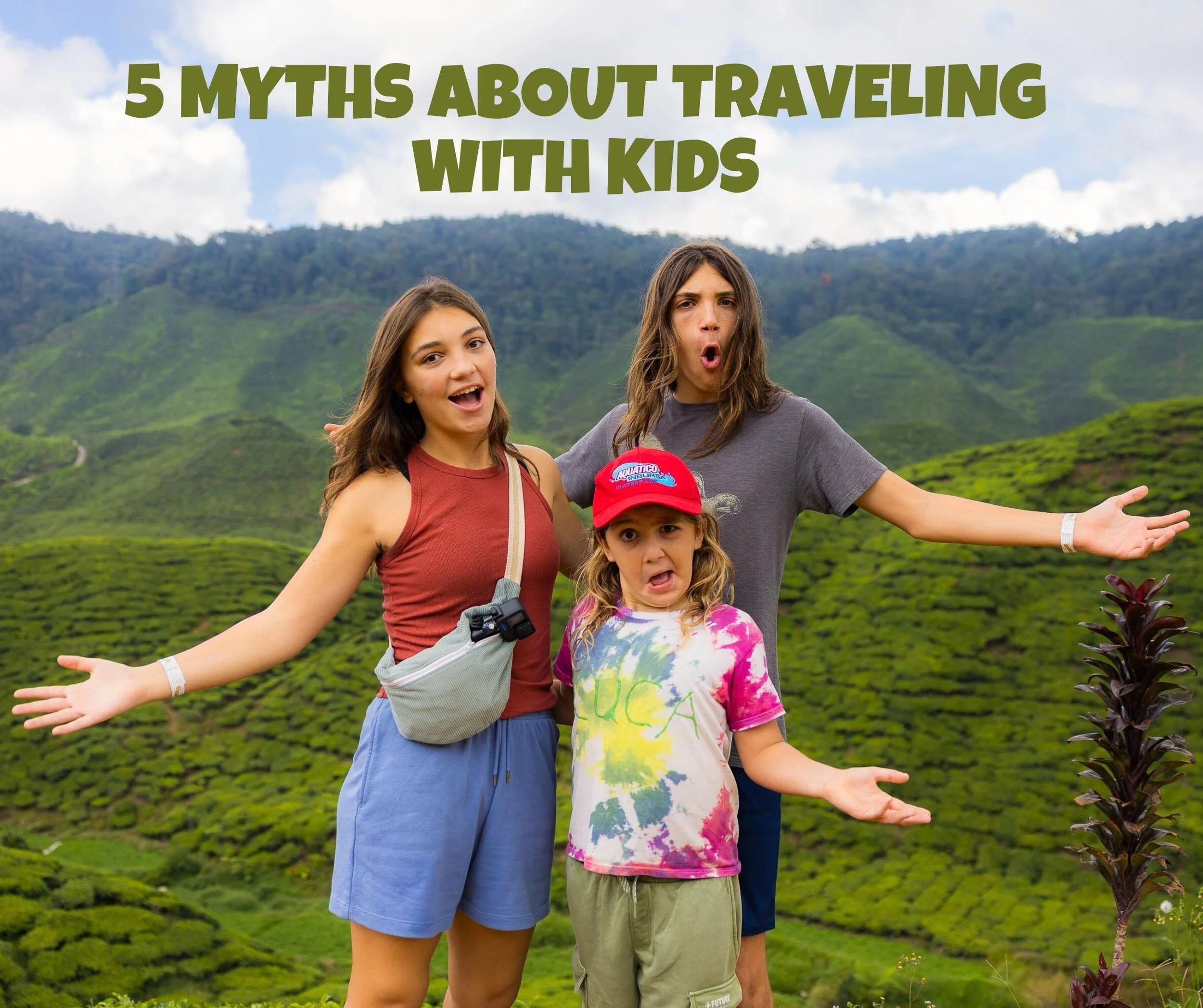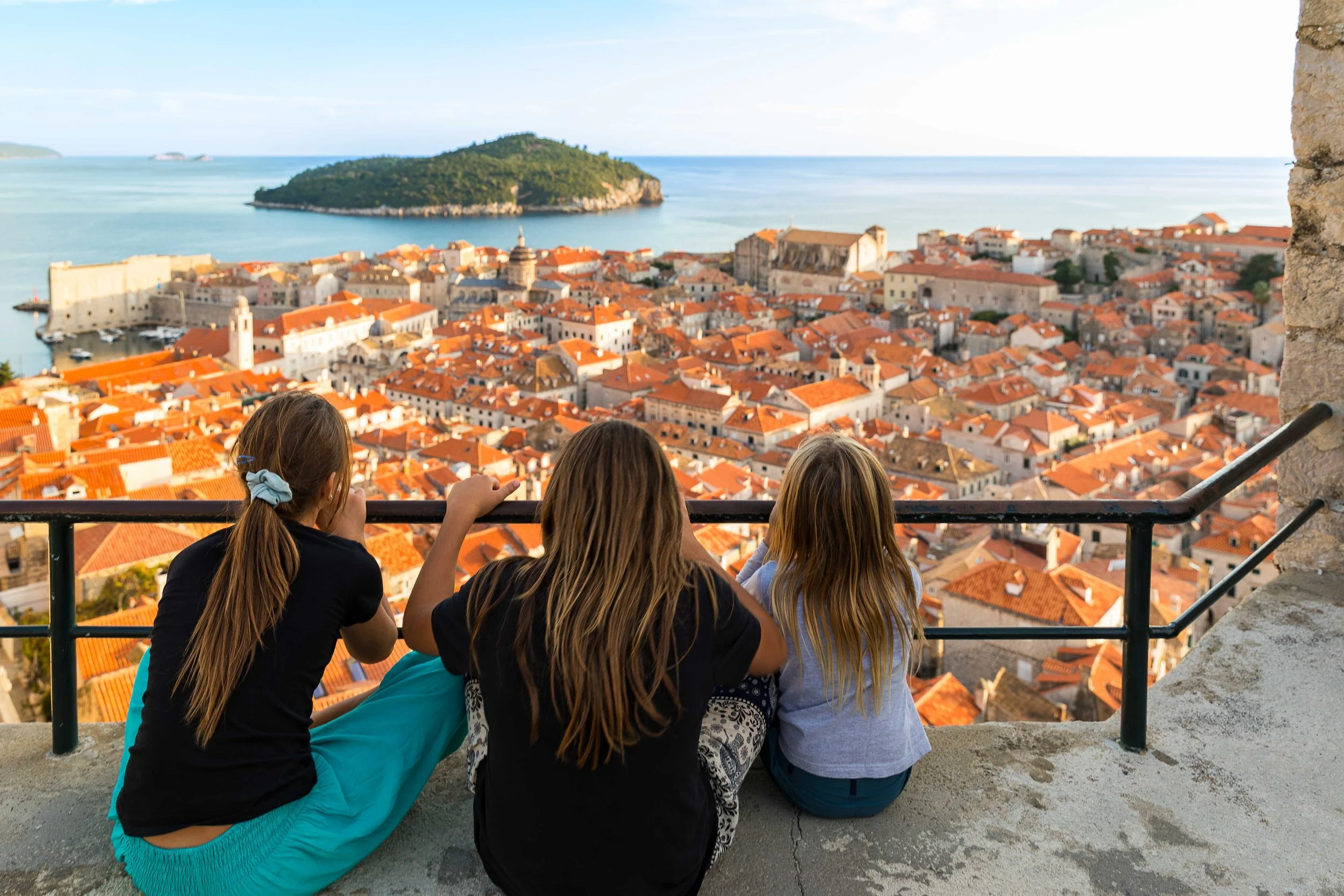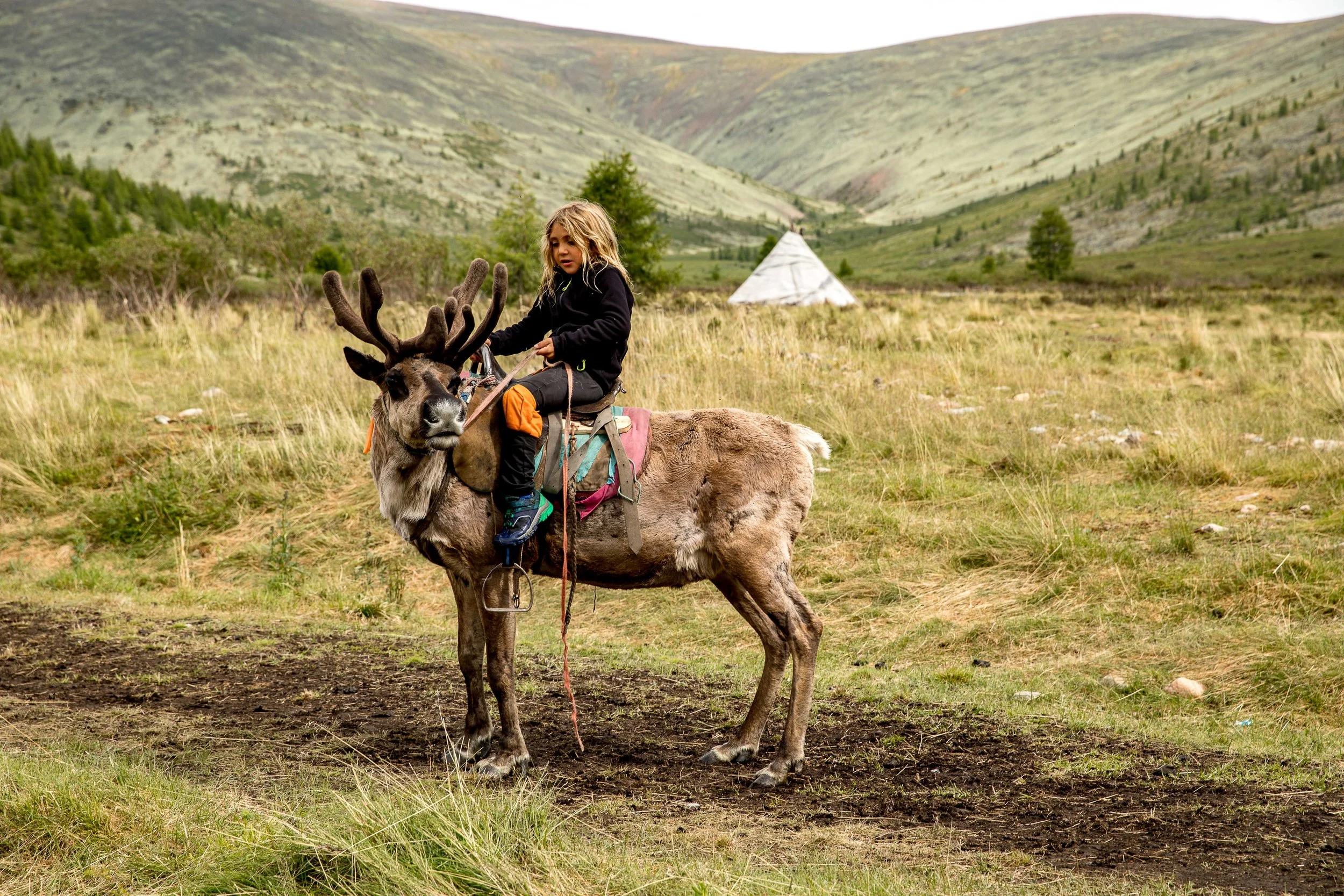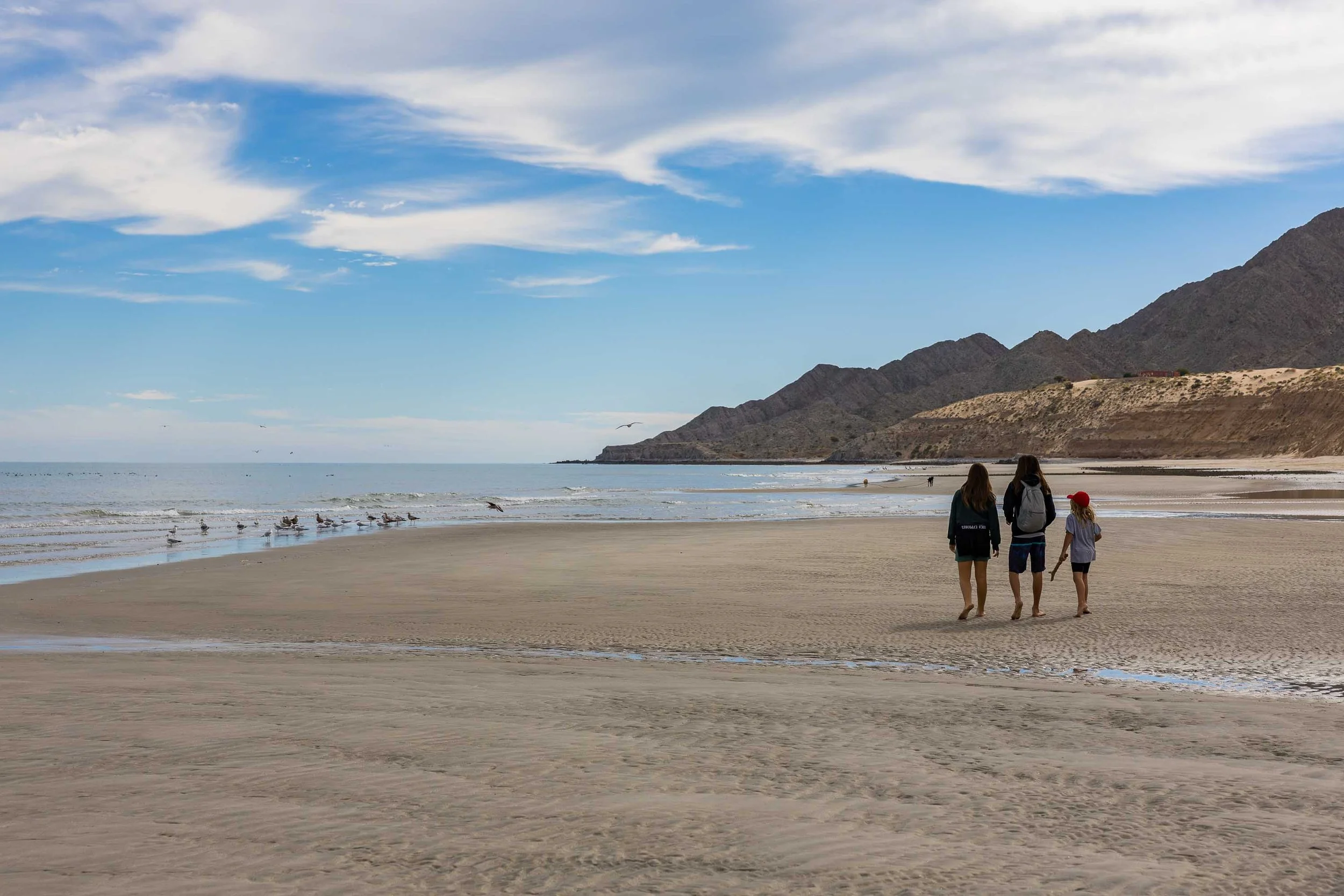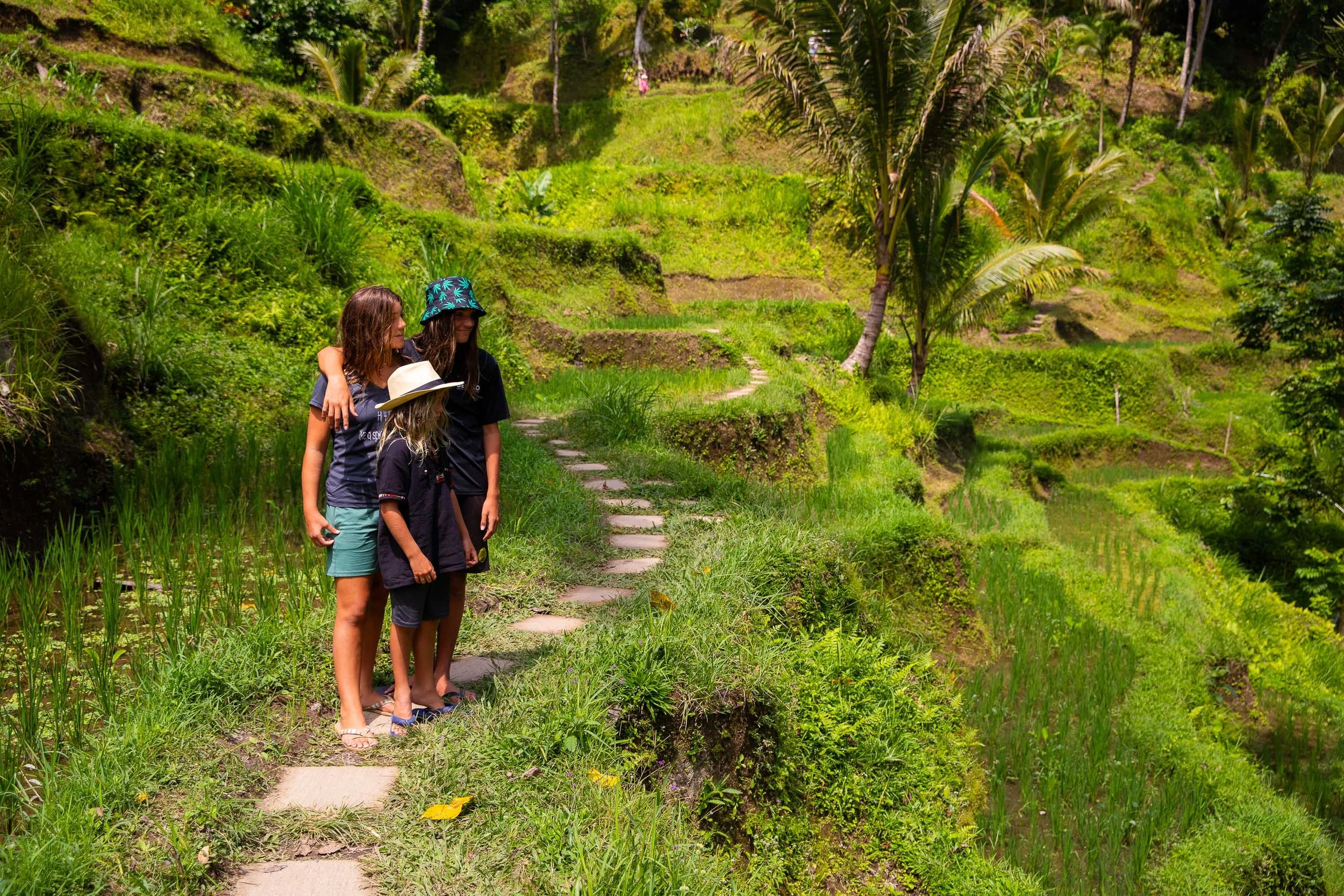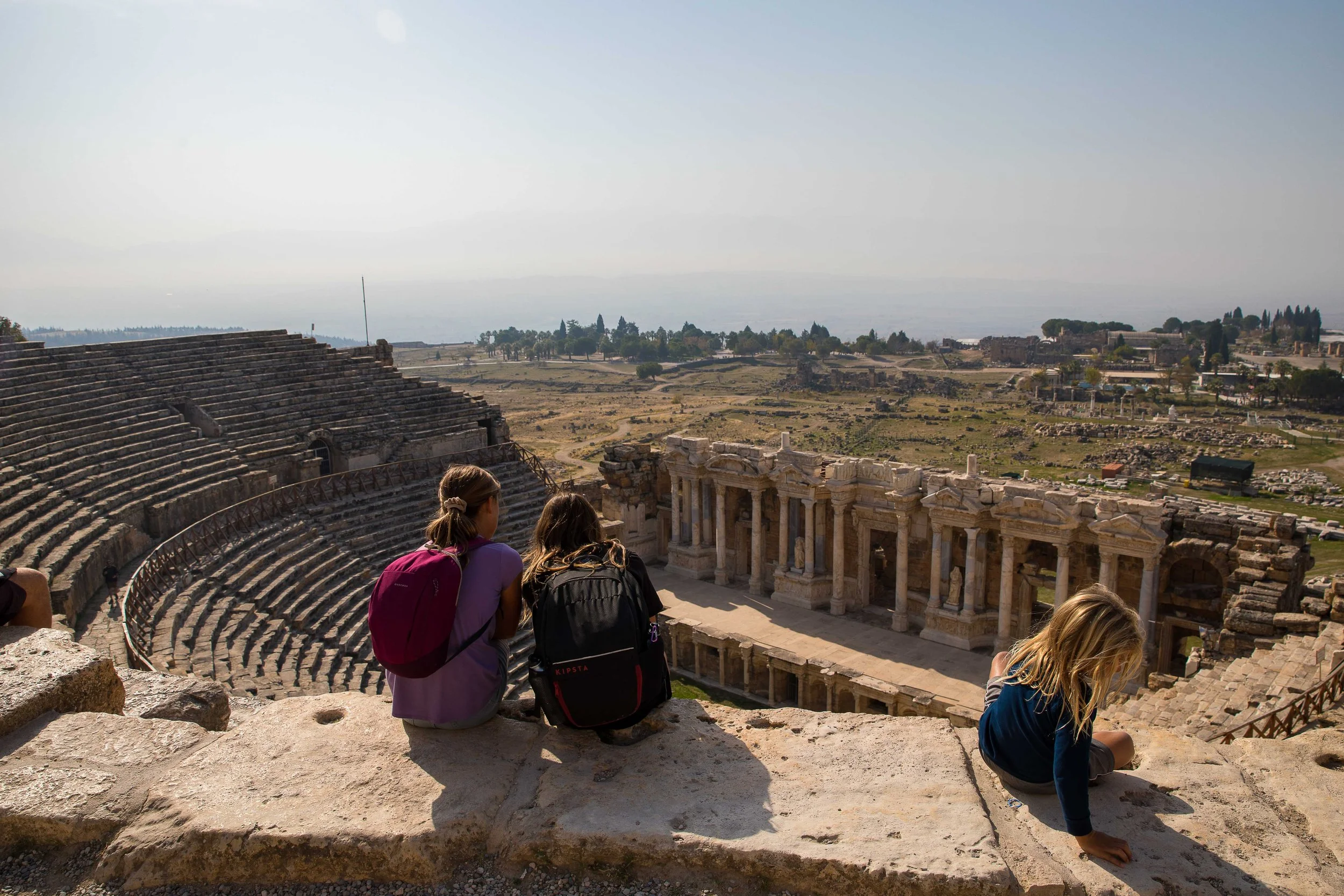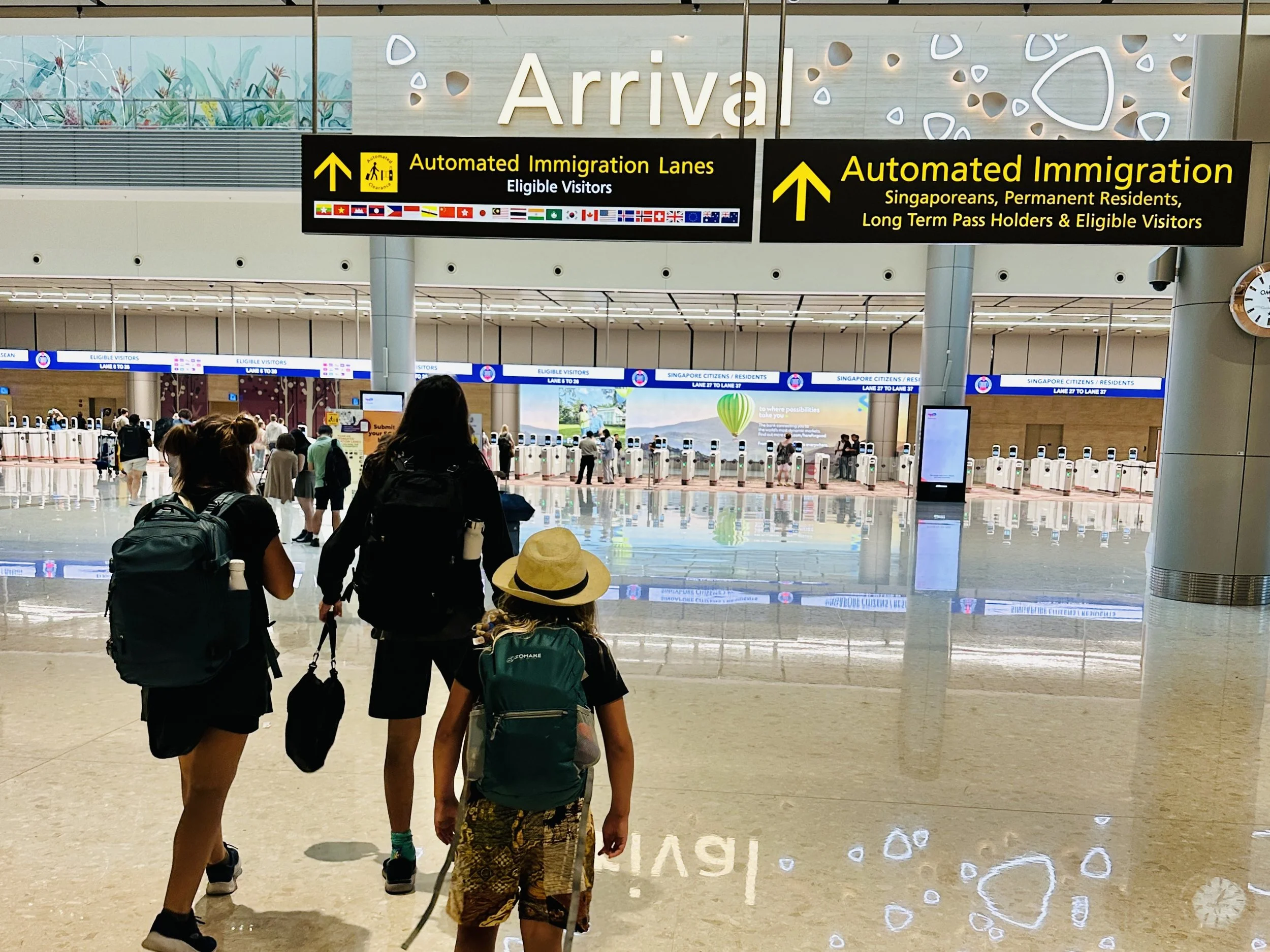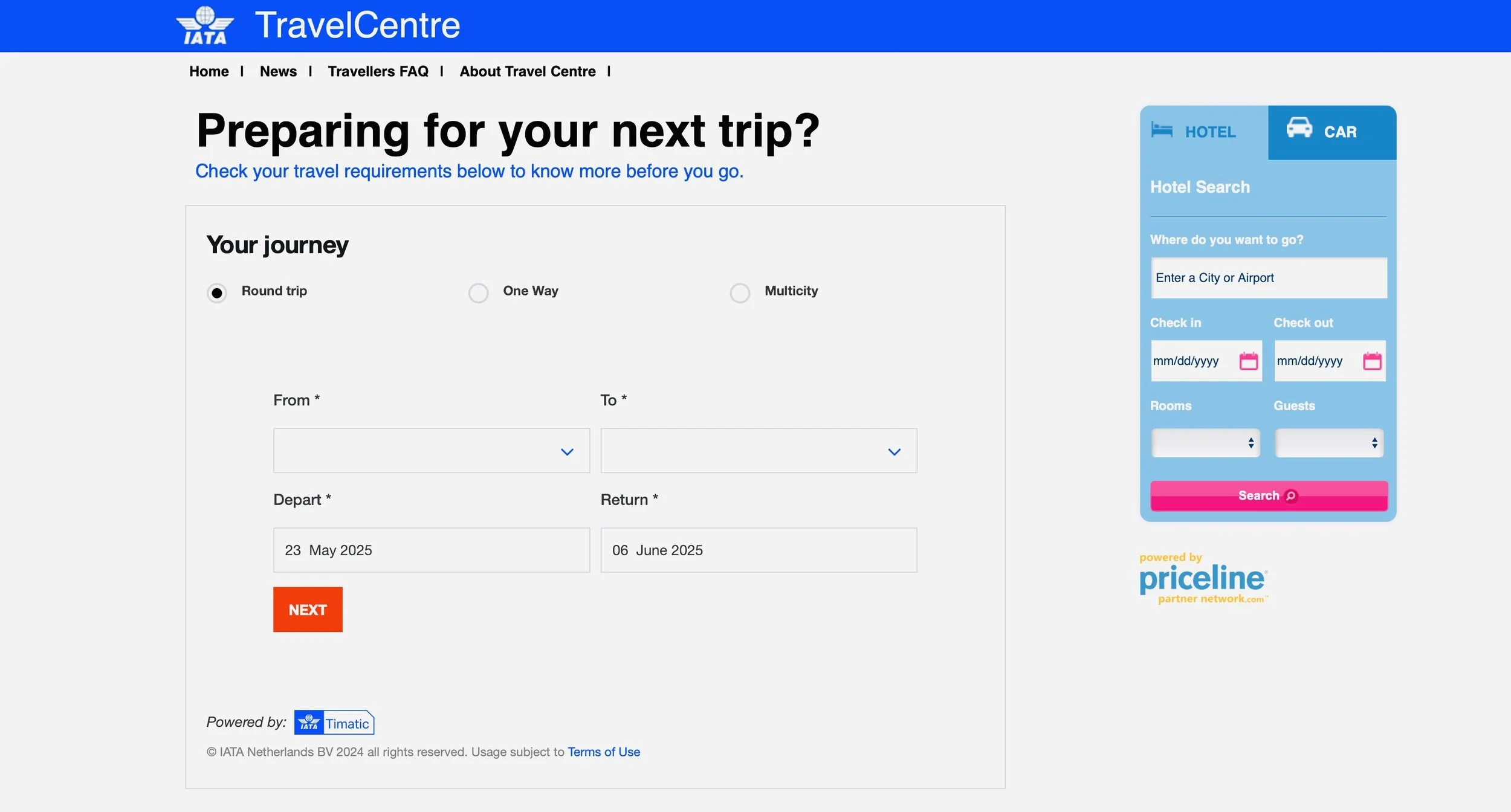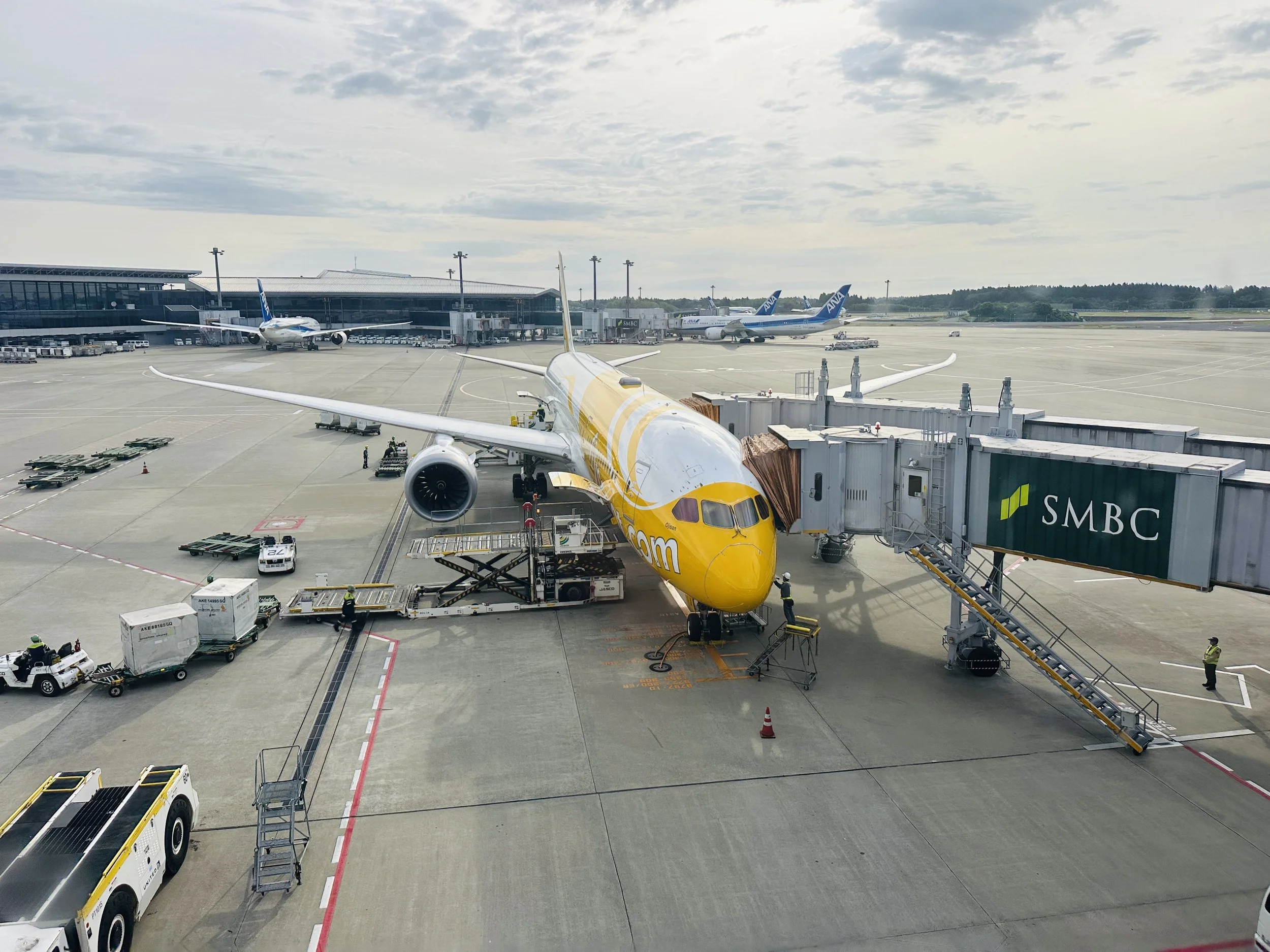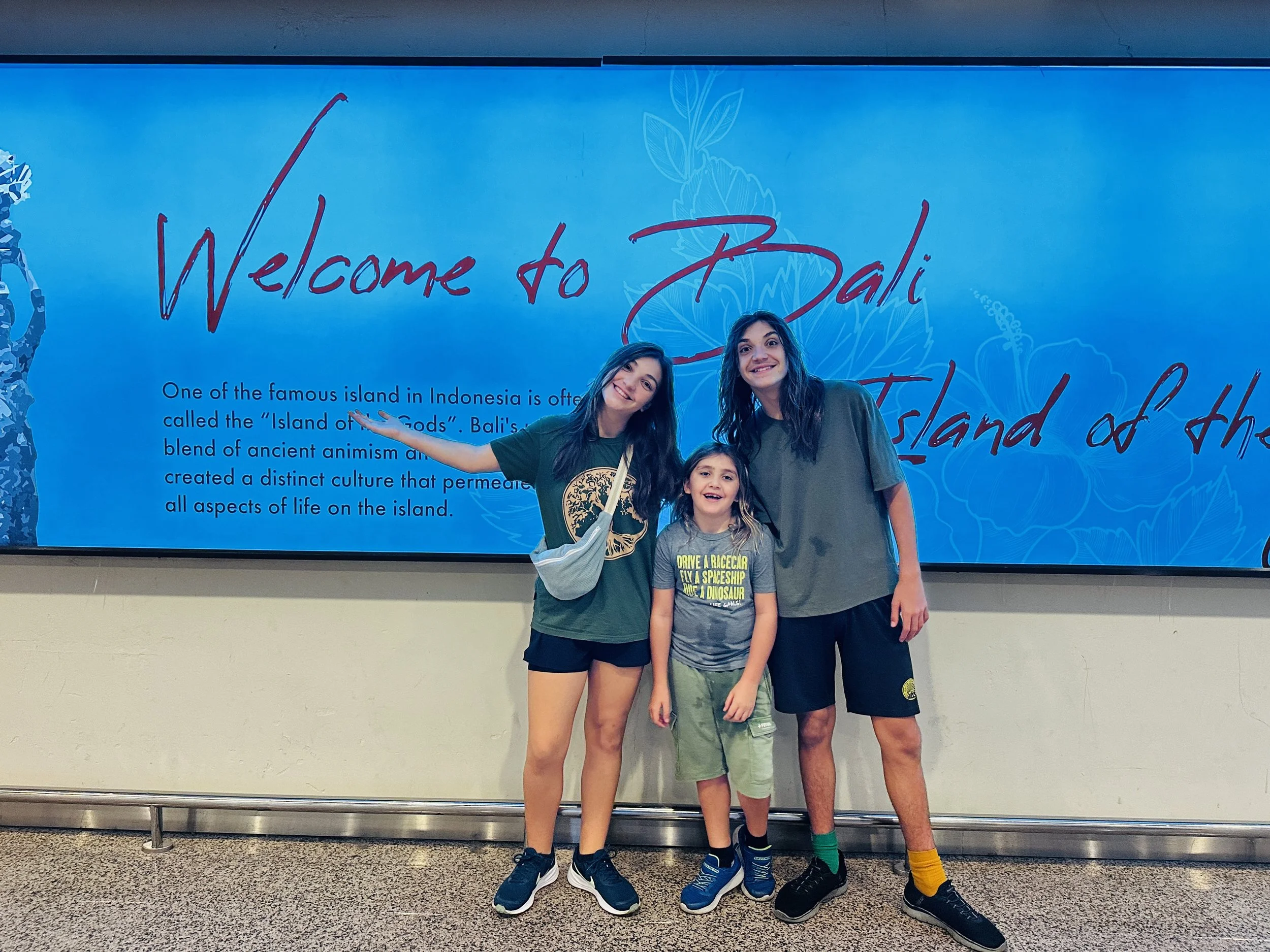Top 5 Myths About Family Travel And What It’s Really Like
Think family travel is too expensive, too stressful, or just not worth it because "the kids won’t remember"? You’re not alone, but you might be surprised. After 7 years of full-time travel with our three kids, we’ve heard it all and lived through the truth behind the myths. In this post, we’re busting the 5 biggest misconceptions about traveling with kids and sharing what it’s really like to explore the world as a family.
When we first told people we were planning to travel the world full-time with our kids, the reactions were mixed. Some were excited for us, others were politely skeptical, and a few were downright shocked.
“Isn’t that dangerous?” “How can you afford it?” “But what about school?” If you’ve ever thought about taking your family on a big travel adventure, even for a few weeks, chances are you’ve heard (or thought) some of these same things.
The truth is, there are many myths surrounding what family travel looks like. After over 7 years on the road with our three kids, I can confidently say that while it’s not always easy, it’s far more doable and rewarding than most people think. So today, I want to bust some of the biggest myths I’ve heard (and believed myself at one point!) and share what family travel is really like.
View of Dubrovnik, Croatia from the walls
Myth #1: “It’s too expensive to travel with kids.”
This is the most common myth we hear. Yes, travel costs money. But so does staying home: mortgages, school fees, extracurriculars, entertainment, eating out, gas, and so much more. When we added it all up, we realized we could live more affordably while traveling, especially in countries with a lower cost of living.
What it’s really like:
We’ve found ways to make travel affordable by:
Choosing destinations where our money stretches further (think Southeast Asia, Central America, Eastern Europe).
Staying in apartments with kitchens, so we don’t eat out for every meal.
Traveling during off-peak seasons.
Booking longer stays to get weekly or monthly discounts.
Using travel points and miles strategically.
Prioritizing experiences over souvenirs or luxury stays.
We’ve even done house sitting, which means free accommodation in exchange for taking care of a home or pet (check out my recent blog post: Our House-Sitting Adventure in France). There are so many ways to make it work, even if you’re not doing it full-time.
Tip: If you need help figuring out how to plan a budget-friendly family adventure, I offer custom trip planning and self-booking tools. Just click here!
Enjoying our meal in our little home in Nepal
Myth #2: “Kids won’t remember the trip anyway.”
This one breaks my heart a little every time I hear it. It assumes that the only reason to travel with kids is so they can remember every detail. However, memory isn’t the only goal; impact is also important.
What it’s really like:
No, our kids don’t remember every meal or hotel. But they remember how it felt to ride a horse for the first time in Bhutan or a reindeer in Mongolia or a camel in the desert in Tunisia. They remember making dumplings in a local home in Nepal. They remember snorkeling with sharks, learning new words in different countries, and the friends they made along the way. These are life-shaping experiences that build resilience, curiosity, and adaptability.
Even if they don’t remember every moment, it becomes part of who they are.
Storytime:
When our youngest was three, we were visiting a temple in Bhutan, after getting a chance to light a candle inside, all he wanted to do was light them all! My husband and I were getting a bit anxious about how he was behaving. A young monk took him outside and sat with him on the step, letting him light as many matches as he wanted. They didn’t speak the same language, but they smiled and shared that moment until Luca was satisfied with his experience and ready to move on. Years later, he still remembers that moment. It stuck with him not because it was grand or expensive, but because it was meaningful.
Luca riding a reindeer in Mongolia
Myth #3: “You can’t relax when you travel with kids.”
To be honest, I kind of believed this one in the beginning. I imagined chaotic airport scenes, hangry meltdowns, and long flights with no sleep. And yes, we’ve had a few of those. But we’ve also found our rhythm.
What it’s really like:
Traveling with kids does require a different pace. We don’t try to cram 10 attractions into one day. Instead, we slow down. We take breaks. We schedule downtime and let the kids play in a park or swim in a pool. We create routines even while on the move. And we’ve learned that some of our most relaxing moments happen because we’re traveling: watching a sunset together, sipping tea on a balcony, walking through a quiet forest.
It’s not about replicating a couples-only getaway. It’s about finding moments of peace within the family chaos.
Tip: Many destinations offer family-friendly accommodations with spaces to cook, relax, and unwind. Those might be a great option to start with!
The kids going for a walk on a beach in Baja California, Mexico
Myth #4: “You have to stick to kid-friendly destinations.”
Many people assume that family travel means theme parks, all-inclusive resorts, or “kid zones.” And while those can be fun, they’re far from the only options.
What it’s really like:
Our kids have walked through the Colosseum in Rome, hiked through rice terraces in Bali, explored temples in Cambodia, and wandered through bustling markets in Morocco. They’ve learned about history, culture, and geography not from a textbook but from real life. And guess what? They loved it.
You can bring kids just about anywhere. It just takes a little extra planning, a bit more flexibility, and the mindset that kids can enjoy and appreciate more than we often give them credit for.
Bonus: Traveling off the beaten path helps your kids become more adaptable and globally aware, and it often leads to the most unforgettable adventures.
Kids exploring rice fields in Ubud, Bali
Myth #5: “Long-term travel ruins routines and education.”
This one might be the hardest myth to let go of, especially if you grew up believing that traditional school is the only path to a good education. I get it. We wrestled with this a lot when we first started.
What it’s really like:
Our kids are worldschoolers. That means they learn from the world around them through experiences, books, conversations, museums, projects, and online resources. Yes, we follow a bit of structure, but we also follow their interests. They’ve learned languages by speaking with locals, geography by crossing borders, and history by walking through ancient cities. And yes, they still do math.
More importantly, they’re learning how to learn. How to ask questions, think critically, adapt to new situations, and connect with people from all walks of life.
And routines?
We have our own kind of routines, morning learning, shared meals, and more. They may not look like a school bell and cafeteria lunch, but they’re grounding and consistent in their own way.
Sitting in Hierapolis Ancient Theater in Turkiye
So, What’s Family Travel Really Like?
It’s messy. It’s magical. It’s filled with unexpected challenges and surprising joys.
We’ve navigated foreign grocery stores without speaking the language, made friends in places we barely knew existed, cried from exhaustion, laughed till we cried, and created memories that I wouldn’t trade for anything.
Family travel isn’t about perfection. It’s about connection. It’s about choosing to step out of your comfort zone together and learning and growing side by side.
Thinking of Traveling with Your Family?
If you’ve been dreaming of taking your kids on an adventure but these myths have held you back, I want to encourage you. You don’t need to go full-time like we did. Even a short trip can be transformative.
Here’s how I can help:
✈️ Custom travel planning: I’ll help you find destinations, accommodations, and activities that match your family’s style and budget.
📌 Self-booking tools: Would you prefer to plan on your own? Use my booking links and still support our journey.
👉 Start here or reach out directly. I’d love to help you create a trip that your whole family will love.
Family travel is not only possible, it’s powerful. Don’t let the myths keep you from discovering what’s out there. You might find that the world becomes your best teacher, your playground, and your family’s most incredible bonding experience.
Where will your family’s next adventure take you?
Everything You Need to Know About Travel Visas (Before You Book That Flight!)
Visas might not be the most exciting part of planning a trip, but skipping this step can cost you—big time. From tourist and digital nomad visas to what really happens if you overstay (yes, even by a day), this guide covers everything you need to know before crossing any border. Whether you're traveling solo, with kids, or full-time, this is the visa breakdown every traveler should read before booking that flight.
If you're anything like us, a family that has been hopping around the globe since 2018, you've learned that you should never book a trip without checking visa requirements first. It's not the most exciting part of travel planning, but it might be the most crucial.
Visas are one of those things you don't think about until they become a problem.
In this guide, we'll walk you through the different types of visas, where to find the most accurate info, and how to make the application process as smooth as possible. Whether you're a solo backpacker, a traveling family, or a digital nomad, understanding visas is key to keeping your adventure stress-free. Why Checking Visa Requirements Should Be Step #1
Imagine booking flights, accommodations, and activities for your dream destination only to find out at the airport that you can't board because you don't have the proper visa. It happens. More often than you'd think!
Here's why you should always check visa requirements before booking anything:
Avoid unexpected expenses: Emergency visa processing (if even possible) can be costly.
Different rules for different passports: Two travelers going to the same country might need completely different documentation.
Denied entry or boarding: Airlines can and will stop you from boarding without proper entry clearance.
We've seen families in tears at the airport. And we've also had close calls ourselves. Now, it's the very first thing we check when considering a destination.
The Main Types of Travel Visas
Visas are a country's permission to enter, stay, or pass through its territory. But not all visas are the same. Here are the most common ones you might encounter:
1. Tourist Visa
This is the most popular visa type for leisure travel. It allows short stays between 15 and 90 days for sightseeing, visiting friends/family, or relaxing. Some countries require you to apply in advance, while others offer Visa on Arrival or e-Visas.
2. Business Visa
This type is for work-related visits like attending meetings, conferences, or negotiations. It doesn't allow you to work in the country per se, but it covers professional activities that don't involve direct employment.
3. Transit Visa
A transit visa may be required if you're passing through a country en route to another destination and your layover exceeds a specific duration. For example, China and Russia often require transit visas, even if you're not leaving the airport.
4. Student Visa
Planning to enroll in a school or university abroad? You'll need a student visa. These often involve more documentation, like an acceptance letter, proof of financial support, and medical clearance.
5. Work Visa
A work visa is essential if you've secured employment in another country. These vary wildly in duration and requirements, usually involving employer sponsorship.
6. Digital Nomad Visa
This is a relatively new category gaining popularity. Countries like Portugal, Estonia, and Indonesia now offer long-stay visas for remote workers. They usually require proof of income, health insurance, and sometimes tax commitments.
7. Visa on Arrival & e-Visas
Some countries allow travelers to apply and pay for a visa after arrival at the airport. Others offer e-visas, which are completed online before you travel. Both are easier than traditional visas but are not "automatic," so you must check the requirements beforehand.
Where to Find Visa Information
You don't want to risk getting outdated or incorrect information regarding visas. Here's where to look:
✅ Official Government Websites
Always start with the official immigration or consulate page of the country you're visiting. These sites list entry requirements by nationality and often provide step-by-step instructions.
✅ Embassies & Consulates
If you're unsure or dealing with a complicated case (extended stay, unusual passport, etc.), contact the embassy or consulate directly. They are the best authority for up-to-date information.
✅ IATA Travel Centre / Timatic Database
Airlines use the Timatic database to determine whether travelers can board based on their documents. You can access a version of this database through IATA's free TravelCentre.
⚠️ Avoid Relying Solely on Blogs or Forums
Travel blogs (even ours!) can be helpful for personal experiences but never rely on them as your only source. Rules change, and what worked for someone last year may no longer apply.
How to Apply for a Visa: Step-by-Step
Visa applications can range from simple (5-minute online form) to highly complex (interviews, fingerprints, bank statements). Here's a basic roadmap:
Determine the visa type you need
Visit the official website of the country's immigration or consular office
Gather required documents such as:
Passport (with at least 6 months validity)
Passport-sized photos
Flight and hotel bookings or invitation letters
Proof of funds
Travel Insurance
Fill out the application
Pay the fee
Schedule an appointment (if required)
Wait for processing
Tip: Make a folder (both digital and physical) to store your visa-related documents for easy access.
What Happens If You Overstay Your Visa?
Overstaying a visa by a day or a month can lead to serious consequences, varying wildly by country. Some travelers assume it's "no big deal," especially if they're only over by a short time. But that's a risky assumption.
Here are the potential consequences of overstaying your visa:
🛑 Fines
Most countries charge a daily or flat fine if you overstay. For example:
Thailand: 500 baht per day (up to 20,000 baht max)
Indonesia: 1 million rupiah per day
Schengen Area: Country-dependent, often combined with penalties or warnings. It varies widely by country. Here's a general idea:
France: Fines can range from €200–€300 ($215–USD 325)
Germany: Often a warning for a short overstay, but fines can go
up to €1,000 (USD 1,080) in more serious cases
Italy/Spain: Similar range, typically €200–€500 ($215–$540
USD)
🧳 Deportation
You may be detained and deported if authorities catch you during a routine check, airport exit, or hotel registration. Deportation records are serious and can impact future travel.
❌ Travel Bans or Blacklisting
Some countries impose entry bans (from 6 months to 10 years) if you overstay:
The United Arab Emirates and India are known for enforcing bans.
Schengen Zone: A flag on your record can prevent re-entry into any of the 27 Schengen countries.
📉 Impact on Future Visa Applications
When you apply for a visa in the future, many countries ask if you've ever overstayed a visa. If your passport is flagged in their immigration database, it could result in:
Denied applications
Longer processing times
Stricter documentation requirements
⚖️ Legal Proceedings
In rare but severe cases, overstaying can lead to legal charges, especially if combined with working illegally, false documentation, or repeated offenses.
What to Do If You Accidentally Overstay
Life happens. Maybe you miscounted days, got sick, or had a flight canceled. If you realize you've overstayed (or are about to):
Contact immigration: Visit a local immigration office and explain your situation. Voluntary disclosure often leads to leniency.
Be honest: Never lie to authorities about your stay or intentions.
Pay any fines: Settle your dues immediately and ask for official proof that you've done so.
Get permission to leave: In some countries, you'll need an exit visa or clearance to depart without further penalties.
The bottom line is to respect visa limits as strictly as flight times. It's not just about the current trip; it's about protecting your ability to travel freely in the future.
Tips to Make the Process Smoother
Here's our go-to checklist to avoid stress:
✅ Start early. Some visas take weeks to process.
✅ Check return ticket requirements. Some countries won't let you in without proof of onward travel.
✅ Verify passport expiration. Must often be valid for 6+ months beyond your stay.
✅ Print documents. Many immigration officers still want paper copies.
✅ Stay updated. Rules change frequently.
❌ Avoid scams. Stick to official websites or trusted third-party services.
Special Notes for Families and Frequent Travelers
✈️ Traveling with Kids
Bring birth certificates or notarized consent letters when one parent travels solo.
Make sure accommodation and tickets include all names.
🔁 Multiple-Entry or Long-Term Visas
It's ideal if you're bouncing between countries or staying in a region for a while.
💼 Visa Services
Agencies help simplify the process but always verify they are legit.
Final Thoughts: Stay Flexible, Stay Informed
Visa rules are one of the most dynamic aspects of travel. They change based on politics, global health events, and international relations.
You might have visited a country visa-free country last year and suddenly found new rules in place this year. Always double-check, even for familiar destinations.
Here are some tools we use to stay in the loop:
Embassy alert subscriptions
Reddit and Facebook expat groups
Smart Traveler Enrollment Program (STEP) for U.S. citizens
Mobile apps like Sherpa, Atlys, or Passport Index
Bonus: Countries with Easiest Entry for Most Passports (As of 2025)
Looking for stress-free destinations? These countries generally offer visa-free or e-visa access to many nationalities:
Thailand
Indonesia
Mexico
Georgia
Turkey
Colombia
Portugal
Kenya
Always confirm based on your specific nationality.
Visas might not be glamorous, but they're essential. With some prep, you can avoid unnecessary stress, fines, or missing out on your travel adventure altogether. A few clicks today can save you a world of trouble tomorrow.
Do you have a visa story or resource to share? Comment below or message us; we're all learning together.

